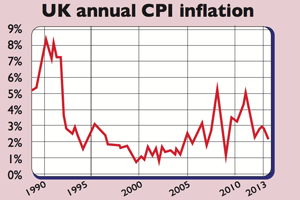Get the latest financial news, insights and expert analysis from our award-winning MoneyWeek team, to help you understand what really matters when it comes to your finances.
You are now subscribed
Your newsletter sign-up was successful
Want to add more newsletters?

Twice daily
MoneyWeek
Get the latest financial news, insights and expert analysis from our award-winning MoneyWeek team, to help you understand what really matters when it comes to your finances.

Four times a week
Look After My Bills
Sign up to our free money-saving newsletter, filled with the latest news and expert advice to help you find the best tips and deals for managing your bills. Start saving today!

In Britain, now that consumer confidence and consumption have gathered pace, "the next thing that should come is the anticipation of pay rises", says Christine Johnson of Old Mutual Global Investors. Households haven't had a real wage rise for five years.
Generally rising demand is one thing, but the amount of supply in Western economies could also be smaller than central banks think. There has been much talk in recent years of the so-called output gap, also referred to as spare capacity in the economy. This is the gulf between an economy's potential and actual GDP.
In a recession this always grows, but the question is how quickly it disappears as recovery sets in and capacity that became idle in the downturn is used again.
MoneyWeek
Subscribe to MoneyWeek today and get your first six magazine issues absolutely FREE

Sign up to Money Morning
Don't miss the latest investment and personal finances news, market analysis, plus money-saving tips with our free twice-daily newsletter
Don't miss the latest investment and personal finances news, market analysis, plus money-saving tips with our free twice-daily newsletter
The output gap is notoriously difficult to measure, and research suggests that after credit-bubble collapses, some capacity is rendered obsolete effectively permanently destroyed rather than merely temporarily idle. In that case, there is now less supply in the economy than central banks have assumed, so it will take less demand to stoke price rises.
In the early 1970s, the US Federal Reserve greatly overestimated spare capacity in America. It thus kept monetary policy too loose before the oil shock, worsening inflation. The unprecedented money-printing post-crisis is also likely to cause trouble. So far there has been scant inflationary impact, says Ben Lord on Bondvigilantes.com, because the printed cash has largely been hoarded by banks.
Once they start lending again in earnest, however, the money will move around the economy much faster. And it is the velocity of money, as well as the supply of money, that determines inflation.
Note too that central banks "have a nasty habit" of keeping monetary policy too loose for too long, as Bondvigilantes.com's Nicolo Carpaneda points out, so inflation could easily become entrenched. If any inflation surge can be capped at 4%-5%, stocks will cope, history suggests. Any higher than that, however as the 1970s showed and they won't.
Get the latest financial news, insights and expert analysis from our award-winning MoneyWeek team, to help you understand what really matters when it comes to your finances.
MoneyWeek is written by a team of experienced and award-winning journalists, plus expert columnists. As well as daily digital news and features, MoneyWeek also publishes a weekly magazine, covering investing and personal finance. From share tips, pensions, gold to practical investment tips - we provide a round-up to help you make money and keep it.
-
 Average UK house price reaches £300,000 for first time, Halifax says
Average UK house price reaches £300,000 for first time, Halifax saysWhile the average house price has topped £300k, regional disparities still remain, Halifax finds.
-
 Barings Emerging Europe trust bounces back from Russia woes
Barings Emerging Europe trust bounces back from Russia woesBarings Emerging Europe trust has added the Middle East and Africa to its mandate, delivering a strong recovery, says Max King

